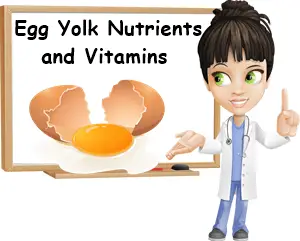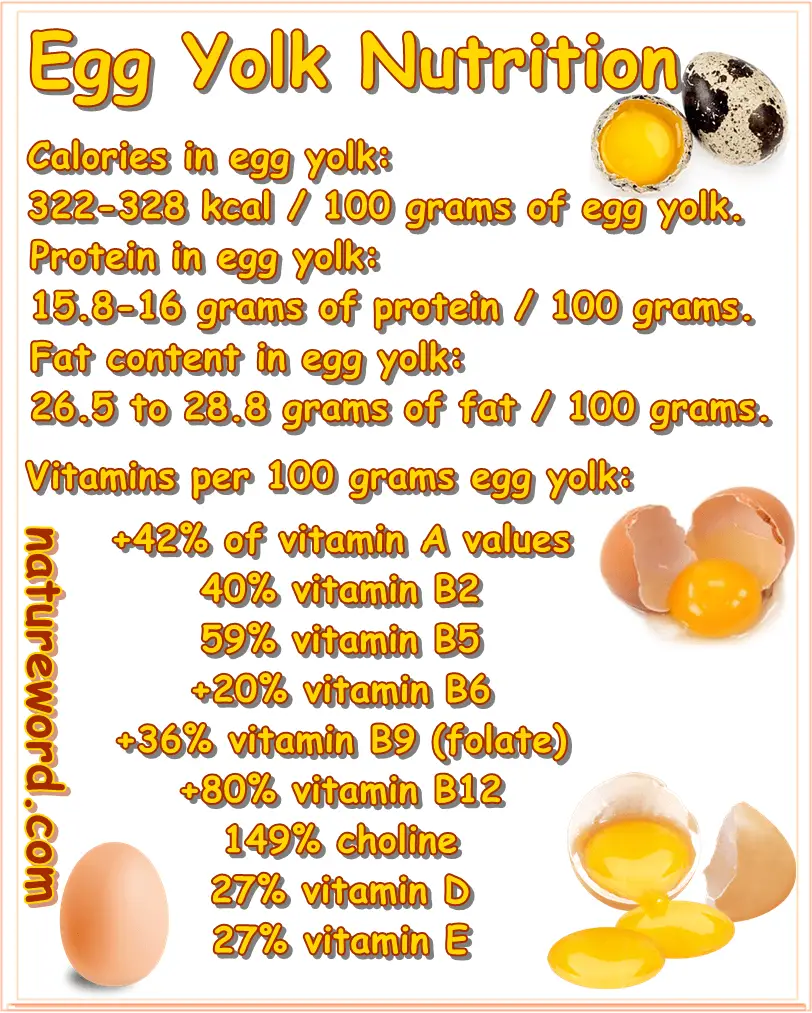How many calories in egg yolk? How much fat in egg yolk? How much protein in egg yolk? What about vitamins and minerals? Egg yolk is actually healthier than egg white and all of its benefits for health are a direct result of its superior nutrition value. With more vitamins and minerals than egg white, and a higher protein content for the same amount, egg yolk is definitely better than egg white if what you’re looking for is nutritionally dense food.
Egg yolk calories
How many calories in egg yolk? There are 322 to 328 kilocalories or calories in 100 grams of egg yolk. By comparison, there are only 52 to 55 calories in 100 grams of egg white and 143 to 147 calories in 100 grams of whole egg. The reason why the egg yolk has so many calories is because it houses virtually all of the fat in the egg, in addition to a high content of protein, as opposed to the egg white which is almost fat free. The values presented apply to chicken eggs and are the lowest of all egg varieties. Quail eggs are slightly higher in calories (158 calories/100 g), followed by turkey eggs (171 calories), then goose eggs (185 calories) and duck eggs (185 calories).

Egg yolk protein content and quality
How much protein in egg yolk? There are 15.8 to 16 grams of protein per 100 grams of egg yolk. By comparison, there are 10 to 11 grams of protein per 100 grams of egg white and about 12.4 grams of protein per 100 grams of whole egg. The protein in egg yolk is also high-quality protein, also called complete protein, meaning it contains all nine essential amino acids that the body needs every day, but cannot produce itself.
Egg yolk fat content and profile
How much fat in egg yolk? There are 26.5 to 28.8 grams of fat in 100 grams of egg yolk. By comparison, there are 0.17 grams of fat per 100 grams of egg white, or less than 0.2%. Whole eggs have 9.96 grams of fat per 100 grams vs one whole egg, medium-sized (50 grams) which has a little over 5 grams of fat. Also, egg yolks have both unsaturated and saturated fat. Fat profile of egg yolk: 9.55 grams of saturated fat, 11.7 grams of monounsaturated fat, 4.2 grams of polyunsaturated fat.
Egg yolk cholesterol content
How much cholesterol in egg yolk? There are 1085 milligrams (mg) of cholesterol in 100 grams of egg yolk vs egg white which has no cholesterol. While being naturally cholesterol free is just one of the many benefits of egg whites, there are just as many benefits of egg yolks that can be attributed to cholesterol itself, including vitamin D synthesis and metabolism for better immunity and improved fertility, hormone production and insulation of nerve cells which is vital for nervous system health.

Egg yolk vitamins
Vitamin A
There are 381 micrograms (mcg) of vitamin A in 100 grams of egg yolk, of which 371 mcg retinol (pre-formed vitamin A) and 10 mcg of vitamin A from carotenoid antioxidants (beta-carotene, alpha-carotene and beta-cryptoxanthin). One egg yolk weighing about 17 grams has 64.8 micrograms of vitamin A, of which 63 micrograms of retinol.
Vitamin B1 (thiamin)
There are 0.03 milligrams (mg) of vitamin B1 in one egg yolk. There are 0.176 milligrams of vitamin B1 per 100 grams of egg yolk. A serving of 100 grams of egg yolk provides over 14% of daily recommended values of vitamin B1.
Vitamin B2 (riboflavin)
There are 0.09 milligrams (mg) of vitamin B2 in one egg yolk. There are 0.528 milligrams of vitamin B1 per 100 grams of egg yolk. A serving of 100 grams of egg yolk provides 40% of daily recommended values of vitamin B2.
Vitamin B3 (niacin)
There are 0.004 milligrams (mg) of vitamin B3 in one egg yolk. There are 0.24 milligrams of vitamin B3 per 100 grams of egg yolk. A serving of 100 grams of egg yolk provides over 1.5% of daily recommended values of vitamin B3 which constitutes trace amounts.
Vitamin B5 (pantothenic acid)
Egg yolk is high in vitamin B5. There are 2.99 milligrams of vitamin B5 per 100 grams of egg yolk. A serving of 100 grams of egg yolk provides over 59% of daily recommended values of vitamin B5.
Vitamin B6 (pyridoxine)
There are 0.059 milligrams (mg) of vitamin B6 in one egg yolk. There are 0.35 milligrams of vitamin B6 per 100 grams of egg yolk. A serving of 100 grams of egg yolk provides 20.5% of daily recommended values of vitamin B6.
Vitamin B9 (folate)
There are 24.8 micrograms (mcg) of vitamin B9 in one egg yolk. There are 146 micrograms of vitamin B9 per 100 grams of egg yolk. A serving of 100 grams of egg yolk provides 36.5% of daily recommended values of vitamin B9.
Choline
There are 139 milligrams (mg) of choline in one egg yolk. There are 820 milligrams of choline per 100 grams of egg yolk. Just one egg yolk provides over 25% of the daily recommended intake of choline for the average adult, while a serving of 100 grams of egg yolk provides 149% of daily recommended values.
Vitamin B12
There are 0.332 micrograms (mcg) of vitamin B12 in one egg yolk. There are 1.95 micrograms of vitamin B12 per 100 grams of egg yolk. Just one egg yolk provides over 13% of the daily recommended intake of vitamin B12 for the average adult, while a serving of 100 grams of egg yolk provides 81% of daily recommended values.
Vitamin C
How much vitamin C in egg yolk? There is no vitamin C in egg yolk.
Vitamin D
There are 0.918 micrograms (mcg) of vitamin D in one egg yolk. There are 5.4 micrograms of vitamin D per 100 grams of egg yolk. A serving of 100 grams of egg yolk provides 27% of daily recommended values of vitamin D, while just one egg yolk has only 4.5% vitamin D.
Vitamin E
There are 0.439 milligrams (mg) of vitamin E in one egg yolk. There are 4.05 milligrams of vitamin E per 100 grams of egg yolk. A serving of 100 grams of egg yolk provides 27% of daily recommended values of vitamin E.
Vitamin K
There are 0.119 micrograms (mcg) of vitamin BK in one egg yolk. There are 0.8 milligrams of vitamin K per 100 grams of egg yolk. The average adult woman needs 90 micrograms of vitamin K every day, while the average adult man 120 micrograms of vitamin K. Egg yolks provide only trace amounts.
Egg yolk minerals
Calcium
There are 21.9 milligrams of calcium in one egg yolk (17 grams per yolk). There are 129 milligrams of calcium per 100 grams of egg yolk. The average adult needs 1300 milligrams of calcium every day, and a serving of 100 grams of egg yolk provides 9.9% of daily calcium requirements.
Copper
There are 0.013 milligrams of copper in one egg yolk (17 grams per yolk). There are 0.077 milligrams of copper per 100 grams of egg yolk. The average adult needs 0.9 milligrams of copper every day, and a serving of 100 grams of egg yolk provides 8.5% of daily copper requirements.
Iron
There are 0.464 milligrams of iron in one egg yolk (17 grams per yolk). There are 2.73 milligrams of iron per 100 grams of egg yolk. The average adult needs 18 milligrams of iron every day, and a serving of 100 grams of egg yolk provides 15% of daily iron requirements.
Magnesium
There are 0.85 milligrams of magnesium in one egg yolk (17 grams per yolk). There are 5 milligrams of magnesium per 100 grams of egg yolk. The average adult needs 400 milligrams of magnesium every day, and a serving of 100 grams of egg yolk provides only 1.25% of daily magnesium requirements which is a trace amount.
Manganese
There are 0.055 milligrams of manganese per 100 grams of egg yolk. The average adult women needs 1.8 milligrams of manganese every day, while men need 2.3 mg. A serving of 100 grams of egg yolk provides only 3% of daily manganese requirements for women, and 2.39% daily manganese for men.
Phosphorus
There are 66.3 milligrams of phosphorus in one egg yolk (17 grams per yolk). There are 390 milligrams of phosphorus per 100 grams of egg yolk. The average adult needs 700 milligrams of phosphorus every day, and a serving of 100 grams of egg yolk provides over 55% of daily phosphorus requirements. Just one egg yolk at 17 grams provides close to 9.5% of daily phosphorus values.
Potassium
There are 18.5 milligrams of potassium in one egg yolk (17 grams per yolk). There are 109 milligrams of potassium per 100 grams of egg yolk. The average adult needs 4700 milligrams of potassium every day, and a serving of 100 grams of egg yolk provides just 2.3% of daily potassium requirements.
Selenium
There are 9.52 micrograms of selenium in one egg yolk (17 grams per yolk). There are 56 micrograms of selenium per 100 grams of egg yolk. The average adult needs 55 micrograms of selenium every day. Just one egg yolk at 17 grams gets you over 17% of your daily selenium requirements, while a serving of 100 grams of egg yolks has over 100% selenium.
Sodium
There are 8.16 milligrams of sodium in one egg yolk (17 grams per yolk). There are 48 milligrams of sodium per 100 grams of egg yolk. The average adult needs 1500 milligrams of sodium every day, and can eat up until 2300 milligrams. Egg yolks are naturally low sodium, and 100 grams of yolk provides only 3.2% of daily sodium requirements.
Zinc
There are 0.391 milligrams of zinc in one egg yolk (17 grams per yolk). There are 2.3 milligrams of zinc per 100 grams of egg yolk. The average adult needs a minimum of 11 milligrams of zinc every day and a serving of 100 grams of egg yolk provides 20.9% of daily zinc requirements.
Note: The nutritional values presented apply to chicken eggs, unless otherwise specified.
